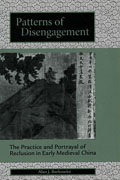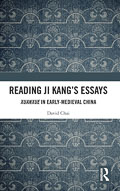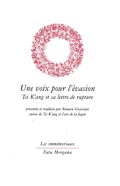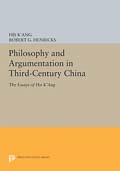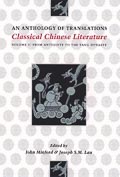start > Klassieke teksten > Personen/auteurs > auteur
Ji Kang / Xi Kang 嵆 康 [Hsi K'ang]
Ji Kang / Xi Kang 嵆 康 [Hsi K'ang] (223-263 n.Chr)
Ji Kang 嵇康 (223–262 CE), wiens oorspronkelijke familienaam Xi 奚 was en wiens stijlnnaam Shuye 叔夜 was, kwam uit het district Zhi 銍 in het vorstendom Qiao 譙 (het huidige Anhui 安徽 provincie). Voordat de Ji-familie naar Qiao verhuisde, woonden ze in het district Kuaiji 會稽 (ook uitgesproken als Guiji).
Xi Kang kwam uit een welvarende familie van geleerde ambtenaren. Zijn vader, Xi Zhao 嵇昭, bekleedde verschillende hoge posities. Hij stierf toen Xi Kang nog een baby was, en Xi werd opgevoed door zijn oudere broer, Xi Xi 嵇喜 (ca. 220–ca. 290), en zijn moeder, née Sun 孫. Xi Kang had al op jonge leeftijd een sterke interesse in het daoïsme, een studie die hij op jonge leeftijd begon. Uiteindelijk werd hij een van de voornaamste pleitbezorgers van zijn tijd voor taoïstisch quietisme en de meer esoterische aspecten van het daoïsme die technieken zoals yang sheng 養生, oftewel “het voeden van het leven,” omvatten.
Rond de jaren 240 trouwde Xi Kang met een prinses van de Cao-clan, Changle tingzhu 長樂亭主, die soms wordt geïdentificeerd als een dochter of kleindochter van Cao Lin 曹林 (gest. 256), een zoon van Cao Cao. Als gevolg van zijn huwelijk werd Xi benoemd tot langzhong 郎中 ('gentleman of the interior'). Rond 245 ontving hij de eretitel zhongsan dafu 中散 大夫 ('grand master of palace leisure'). Daarom wordt hij vaak Xi Zhongsan genoemd. Xi Kang verhuisde vervolgens naar Shanyang 山陽 (ten zuidoosten van het moderne Jiaozuo 焦作, Henan, gelegen ongeveer 60 km ten noordoosten van Luoyang). Xi Kang bleef hier het grootste deel van de rest van zijn leven. Hier ontmoette hij veel van zijn vrienden voor "pure conversatie" (清談 Qīngtán).
Xi Kang had een bijzonder goede band met een libertijn en anti-ritualist genaamd Lü An 呂安 (gest. 263), evenals zijn zes metgezellen die tot de zogenaamde Bamboebos-groep behoorden. Xi Kang was terughoudend om een regeringsfunctie te aanvaarden, en in dit opzicht verschilde hij van zijn oudere broer, Xi Xi, die posities in het Sima-regime accepteerde.
Xi Kang's minachting voor conventies en autoriteit leidde uiteindelijk tot zijn dood. (...) Xi Kang werd naar de Oostelijke Markt van Luoyang gebracht en geëxecuteerd, waarschijnlijk in 262.
Xi Kang's verzamelde werken, die bekend stonden als Xi Kang ji 嵇康集, bestonden ooit uit vijftien juan. Tussen de Tang- en Song-dynastieën gingen vijf juan verloren.
Onder de bewaard gebleven geschriften van Xi Kang bevinden zich zestig shi-gedichten. Dertig zijn in regels van vier lettergrepen, twaalf in regels van vijf lettergrepen, tien in regels van zes lettergrepen, en acht in onregelmatige patronen. Het dominante thema in zijn poëzie is "ontsnappen aan de wereld en haar gevaren en het streven naar een betere wereld, de wereld van de taoïstische onsterfelijken" (Holzman, “La Poésie de Ji Kang,” in Holzman David 1998 Immortals, Festivals, and Poetry in Medieval China p 114).
Xi Kang was een begaafd citer-speler en een expert in muziek. Hij schreef een lang essay getiteld sheng wu ai le lun 聲無哀樂論 ('On the non-emotional nature of music') waarin hij betoogt dat muziek geen intrinsieke emotie heeft. De emotie wordt alleen gevoeld door degenen die door de muziek worden beïnvloed.
Xi Kang had ook een sterke interesse in kluizenaars. Hij stelde de Shengxian gaoshi zhuan zan 聖賢高士傳讚 samen ('Accounts with encomia of sage and worth high-minded gentlemen').
De essays van Ji Kang zijn in het Engels vertaald door Robert G.Henricks 1983 en David Chai 2021:
聲無哀樂論 Shēng wú āi lè lùn - Music has in it neither Grief nor Joy *
釋私論 Shì sī lùn - On Dispelling Self-Interest
明膽論 Míng dǎn lùn - On Wisdom and Courage
自然好學論 Zìrán hàoxué lùn - On the Natural Joy of Learning (met repliek) *
養生論 Yǎngshēng lùn - On Nourishing Life (met repliek en weerwoord) *
宅無吉凶攝生論 Zhái wú jíxiōng shèshēng lùn - Residences Are Not Auspicious or Inauspicious, One Must Assist Life (met repliek en weerwoord)
* partiële vertaling in het Nederlands door Jan de Meyer.
Henricks heeft nog het korte essay: An essay on Kuan and Ts'ai
Jan de Meyer geeft in zijn bloemlezing De weg en de deugd uit 2021 een (partiële) Nederlandse vertaling van de volgende essays:
- Dispuut over het voeden van het leven,
- Klanken zijn vrij van verdriet en vreugde,
- Dispuut over de spontane liefde voor de studie.
Klassieke teksten
- schrijver van de Xi Kang ji (Ji Kang's verzameld werk)- schrijver van de Xi Kang Ji poezie (De gedichten van de Xi Kang Ji)
- samensteller van de Yu Shan Juyuan Juejiao shu (Brief aan Shan Tao)
- schrijver van de Qin Fu (Rhapsody on the Zither)
- schrijver van de Yangsheng Lun (Over het voeden van het leven)
- samensteller van de Shengxian gaoshi zhuan zan (Accounts with encomia of sage and worth high-minded gentlemen)
Literatuur
Boeken 1 tot 20 van de 26

Ashmore, Robert (2014). The Art of Discourse: Xi Kang's sound Is Without Sadness or Joy'. In Wendy Swartz, Early Medieval China hst 12, pag. 201-229 *. Columbia University Press
Meer informatie...
Berkowitz, Alan J. (2000). Patterns of Disengagement: The practice and portrayal of reclusion in early medieval China. Stanford University Press. *
ISBN10: 0804736030
Meer informatie...
Chai, David (2021). Reading Ji Kang's Essays. Routledge. *
ISBN13: 978-0367353636
Meer informatie...



Chan, Timothy Wai Keung (1996). Ruan Ji and Xi Kang's Visits to Two 'Immortals'. Monumenta Serica, Vol. 44, pag. 141-165. *.
Meer informatie...
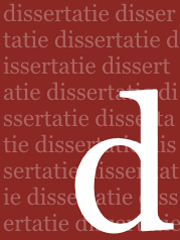
Gary, Julie (2015). Esthétique de la Musique en Chine Médiévale: idéologies, débats en Pratiques chez Ruan Ji et Ji kang. *
Ook online.
Meer informatie...
Graziani, Romain (2015). Une voix pour l’évasion : Tsi K’ang et sa lettre de rupture. Fata Morgana.
ISBN13: 978-2851949431
Meer informatie...
Gulik, Robert Hans van (1969). Hsi K'ang and his Poetical Essay on the Lute. *
1e editie 1941, herziene editie 1969, Sophia University Tokyo
Meer informatie...
Henricks, Robert G. (1983). Philosophy and Argumentation in Third-Century China: The Essays of Hsi K'ang. Princeton University Press. *
Meer informatie...


Hightower, James R. (1965). Hsi K'ang: Letter to Shan Tao. In Cyril Birch, Anthology of Chinese Literature Volume I, pag. 162-166 *. Grove Press
Holzman, Donald (1998). Immortals, Festivals and Poetry in Medieval China: Studies in Social and Intellectual History. *
Meer informatie...

Meer informatie...

Meer informatie...

Jansen, Thomas (2006). The Art of Severing Relationships (Juejiao) in Early Medieval China. Journal of the American Oriental Society, Vol. 126-3, pag. 347-365. *.
Meer informatie...

Mather, Richard B. (1970). The Controversy over Conformity and Naturalness during the Six Dynasties. History of Religions, Vol. 9-2/3, pag. 160-180. *.
Meyer, Jan de (2021). De deugd en de weg: Chinese disputen uit de derde en vierde eeuw. Boom. *
ISBN13: 978-9024431038
Meer informatie...

Middendorf, Ulrike (2010). The Sage without Emotion: Music, Mind, and Politics in Xi Kang. In Alan K.L. Chan, Philosophy and Religion in Early Medieval China *. SUNY Press
Minford, John, redactie (2000). Classical Chinese Literature: An Anthology of Translations Vol 1 From Antiquity to the Tang Dynasty. Columbia University Press. *
ISBN13: 978-0231096768
Meer informatie...
Boeken 1 tot 20 van de 26

